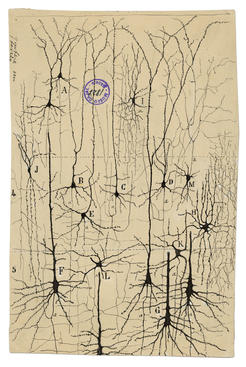
Medical and Health Humanities Studies Minor

Individuated neurons, notebook illustration,
by Santiago Ramón y Cajal (1852-1934)
Spanish artist, physician, neuro-anatomist,
known as the founder of modern neuroscience.
What is Medical and Health Humanities?
The Medical and Health Humanities is a vibrant interdisciplinary field that examines how people understand, experience, and document health and medicine. With areas such as the literature and medicine, philosophy and bioethics, medical anthropology, narrative medicine, the arts and the history of the human body, and theoretical perspectives such as disability studies, critical race and postcolonial studies, trauma studies, gender, and queer theory, this field is centered around the cultivation of critical, sensitive, informed and innovative approaches to cultures of care.
Why Minor in Medical Health and Humanities?
With an urgent focus, particularly in an era of the pandemic, on narratives, technologies, and ideologies of wellness, care, and illness, and on social and institutional forms of health that can also harm, this minor adds an essential dimension to any undergraduate major–from those working across the humanities to those hoping to work, specifically, in the health professions.
- The MHHS minor is open to UCR undergraduates from any discipline. This minor can be shaped by each student, allowing you to design a course of study around your own interests, ideally, in conversation with your advisor or the MHHS co-chairs.
- MHHS is also extremely helpful if you are a premedical student or a student interested in other health professions (pre-PA, pre-PT, pre-OT, nursing, clinical psychology, etc.). Studies show that health professionals who studied premedical humanities perform better in clinical interactions and are more likely to demonstrate empathy, skillful communication, and a patient-centered approach.
- MHHS builds on your interests in diversity and social equity and brings our faculty’s unique strengths in bringing humanities research to medical and health issues past and present. Studies suggest that medical and health humanities will prepare you for critical and creative thinking, identification of internal biases, and ethical reasoning in decision-making processes.
- The fundamentally interdisciplinary nature of MHHS, which involves the humanities, the social sciences, and the arts, allows you to bridge areas of study, experience a range of disciplinary perspectives, and have immediate access to a broad range of exceptional faculty at UCR.
How to Minor in Medical Health and Humanities Studies
The Medical and Health Humanities Studies minor (MHHS) is only five additional courses (20 units).
Enrolling in MHHS is easy:
- First, consult with your undergraduate advisor to make a study plan.
- Next, you'll complete five courses:
- Introduction to Medical and Health Humanities (MHHS 001) taught by MHHS faculty
- Three courses of your choice, based on your interests and offered from the many cross-listed courses from participating departments
- A capstone seminar (MHHS 191) taught by MHHS faculty
The only course with a prerequisite is the capstone seminar (MHHS 191), to be preceded by the introductory course (MHHS 001) and ideally taken after you have taken at least 2 other MHHS courses. See the course catalog for details. You may petition for any upper-division humanities course to count as a minor elective. To do this, please email Professors Mazzio and Wang (carlam@ucr.edu, fusonw@ucr.edu) with the course's syllabus attached. Once you've received approval, forward it to the undergraduate advisor for MHHS (now Elaine Chacon at elaine.chacon@ucr.edu).
QUESTIONS? Contact Professors Carla Mazzio (carlam@ucr.edu) or Fuson Wang (fusonw@ucr.edu).